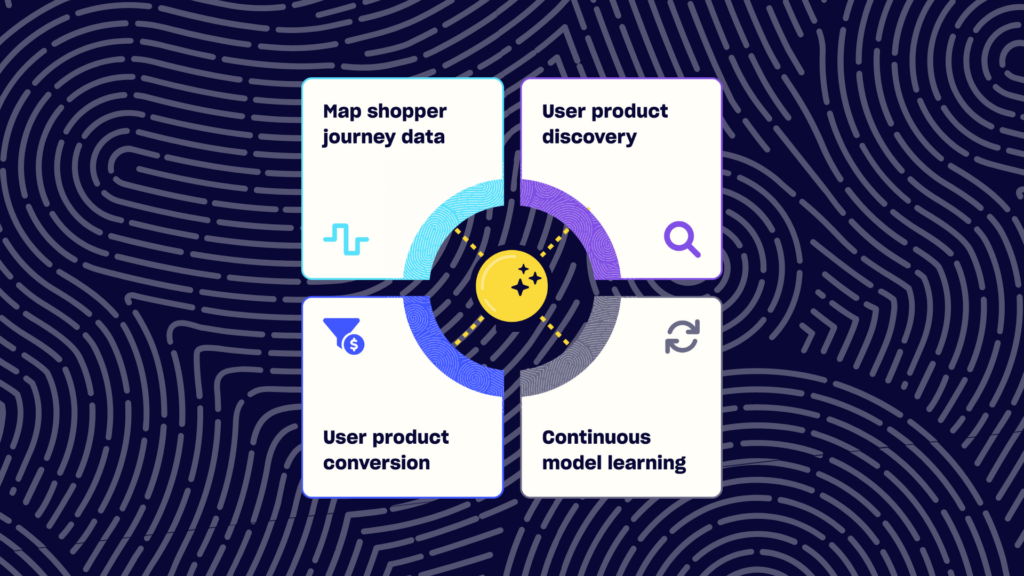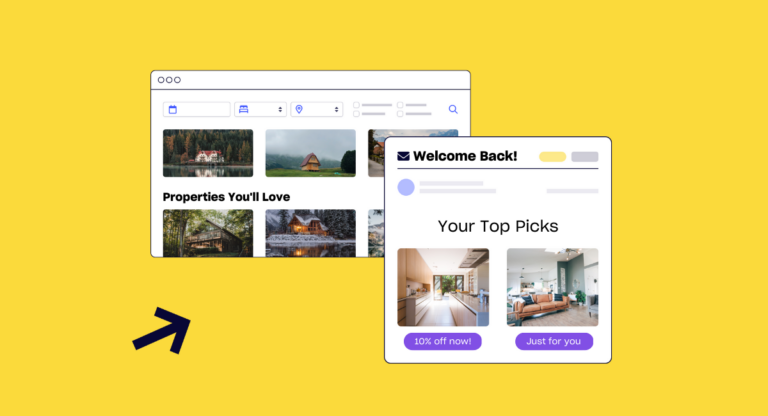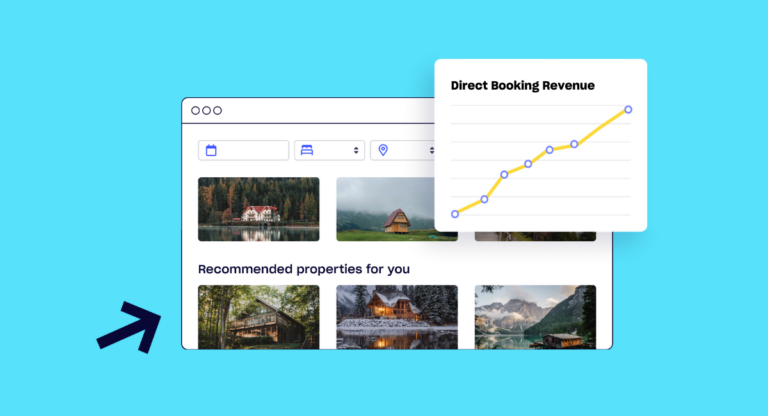What is Predictive Search? A clear-cut guide
Shoppers use website search to help them find the right products – and they use it frequently.
That means your website search is a hands-on touchpoint that shoppers pay attention to, directing their interest into purchases.
As a result, eCommerce site search is a uniquely high-impact, high-potential moment in the shopping process.
But despite its importance, most D2C brands still use lightweight, basic search functionality. And it’s hurting the business.
The lack of personalization, recommendations, and conversion optimization in these search tools means:
- lower conversion rates,
- worse product discovery,
- and less relevance for shoppers.
So eCommerce leaders have started investing in more powerful search providers.
The rise of predictive personalization engines has set a new standard for customer experiences. Predictive search is a method to automatically personalize search results to give shoppers a better experience and create more sales.
In this clear-cut guide, we’ll teach you exactly what predictive search is; how to get started; and why it’s valuable.
Predictive Search definition
Predictive Search
[ pri-dik-tiv • sərCH ]
Predictive Search is automatically personalizing website search results to every individual shopper based on predicted affinity and intent.
Search bars are fundamental to the digital world.
But the evolution of search has transformed drastically as our needs have grown.
While it was initially built using simple text matching, more and more complexities have been incorporated over time: popularity, natural language misspellings, relevance indicators, recommended auto-completion, etc.
Predictive search is the newest and most advanced development in this lifecycle, and is driven by machine learning technology.
Predictive search layers one-to-one personalization into the search results – automatically.
Most eCommerce website search functionality is too basic: it’s just a small feature of a large platform.
Other custom search solutions can only truly personalize for a logged-in user, not for every new site visitor.
Predicting the interests of each website visitor – including unknown shoppers – is the key differentiator that turns plain site search into a revenue generating touchpoint… predictive search.
How Predictive Search works
It’s fairly straightforward to understand. Let’s break down how predictive search works.
1. Machine learning figures out shopper behavior
Under the hood, the predictive “engine” organizes and processes web and transaction data for all customer journeys.
Mathematical models generate accurate predictions of product preferences, price sensitivity, and conversion likelihood for each individual.
2. Personalized search result sorting
When a shopper lands on your website, the predictive personalization engine immediately determines the most relevant products for that person’s interests – across your entire product / property catalog.
So when she types a search, the real-time results are displayed in order of relevance: starting at the top with the most personally appropriate.
3. Continuous improvement
All interaction data – e.g., searches, clicks, purchases, abandonment – enters a feedback loop to re-train the machine learning engine.
That user’s next search takes into account their previous web behavior.
But further, this learning process improves the overall predictions over time, making search results more accurate, more personalized, and higher performing for all shoppers.

Benefits of Predictive Recommendations
Big tech platforms like Amazon, Booking.com, and Google use predictive search to show relevant results to each shopper: what she wants; what might catch her eye; what she is likely to buy.
There’s no confusion about why they do this… it’s because it works.
People prioritize personalization:
- Accenture reported that 91% of consumers said they would shop with brands more often that provided relevant experiences.
- Companies running advanced personalization are sharing that they see a 20-to-1 return on investment for their efforts.
Plus, search is proven as a valuable consumer touchpoint:
- Research suggests around 43% of your site visitors use the search bar straightaway. So personalizing search results will optimize each of those interactions.
- Shoppers using search have shown a 180% higher conversion rate than the average visitor.
As a result, predictive search generates more engagement, more sales, better product discovery, and higher order values.
Real Life Example
The marketing team at Bearbottom Clothing has a high bar for their conversion rate optimization and performance marketing.
They deployed predictive search and recommendations on their site to get more out of their expensive Facebook and Instagram traffic.
The predictive search results alone led to 17% higher clickthrough rates and 39% higher AOV.
Read the Bearbottom Clothing success story.
Why D2C brands are prioritizing Predictive Search now
Brands have invested heavily in personalization because it performs very well: both for customer satisfaction and their bottom-line revenue.
Shoppers rely on search, product recommendations, and other touchpoints to guide them to the right products.
When it’s difficult for people to find what they like quickly… they leave, search elsewhere, and you waste your ad budget.
Advanced personalization tools are expanding and brands are taking advantage of them. As a result, the digital shopping environment is becoming more and more competitive.
If you haven’t prioritized one-to-one personalization yet, it’s not too late.
The power of machine-learning backed predictive personalization has been democratized to small and mid-sized businesses to take advantage of.
Below we’ll talk about how to get started.
3 Ways Predictive Search Creates Value
Now that we’ve established the fundamentals surrounding predictive search, let’s look at the ways that it creates value.
1. High impact product recommendations
Personalized product recommendations are one of the highest priority D2C touchpoints for driving better website conversions.
Shoppers using website search are explicitly looking at the search results.
This makes this results page one of the best opportunities to put the right product in front of the right person at the right time.
Predictive search results are a form of product recommendations: ranking the most relevant products first. And as we know… product recommendations generate sales.
2. Improving product discovery
By their nature, search results are limited.
But shopping is usually more than simply searching for the exact item you want, buying it, and leaving.
It’s a discovery process.
Expanding search results improves product discovery.
Predictive search will identify shopper interests beyond that actual search term. For example, it can use data like paid campaign id, product page views, and location to predict new, relevant products to display.
3. Removing complexity with machine learning
When you’re writing product titles, descriptions, and tags, your phrasing might not match precisely to the varied terminology of shoppers.
Categories and descriptions often differ from person to person!
And shoppers type searches intentionally broad or specific as they figure out what they want.
Optimizing search results typically takes time to do well (just think about how much can go into SEO for Google search!) But with machine learning involved, that work is automated.
Predictive search removes complexity in this search <-> result matching process. By predicting the customer affinity and intent, the results will automatically include relevant options.
Bonus: Happier Customers
Any chance you have to give that personal touch to shoppers is a great opportunity.
Your social media, ads, emails, content, and website are built to create a positive brand experience.
Using predictive personalization makes those touchpoints even better.
Whether the personalized touchpoints are large or small, they impact customer experience positively. Predictive search is a way to improve one of these key moments.
Get started with Predictive Search
Unsophisticated website search creates a big risk.
Leaving a critical touchpoint like website search in the control of “out-of-the-box”, non-personalized tools is bad news: decreasing AOV, ROAS, and conversion rates.
As a solution, predictive search uses real time & historical context about every website visitor to automate and personalize CRO & product discovery.
And launching is simple.
Now you know what predictive search is, how it works, and where it creates value. So, how do you get started?
Aidaptive can get predictive search live on your website in just a couple of days.
Simply integrate our predictive personalization engine with your core systems, give the ML-models some time to learn your shopper behavior, then toggle it on in the back-end of your eCommerce platform or PMS.
If you’d like to schedule a chat, reach out to our team! We’ll answer your questions and help you set up a test to make sure you’re getting the best possible performance.
To learn more, you can read about predictive personalization in this guide.


